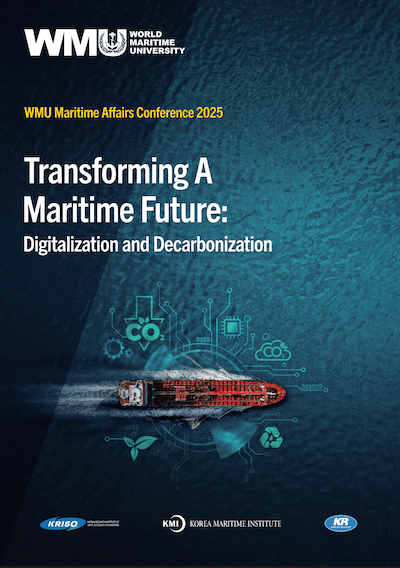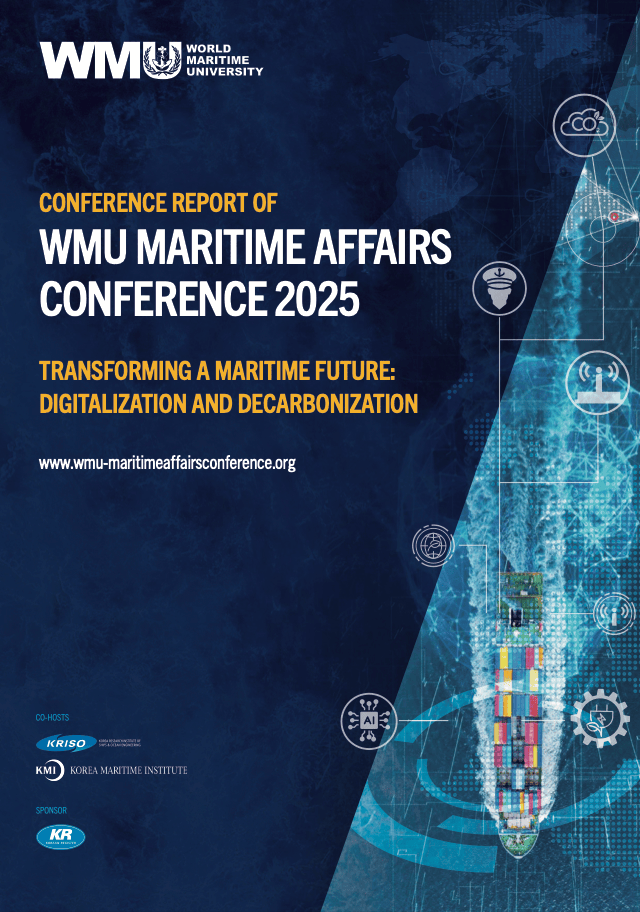
About
programmes
research


Insights of the WMU Maritime Affairs Conference 2025, this book brings together leading experts from across the maritime world to explore the future of shipping. From digital innovation to decarbonization strategies, it offers practical solutions, policy perspectives, and cutting-edge research to shape a sustainable and modern maritime industry.
READ MORE >

Conference proceedings from the WMU Maritime Affairs Conference 2025, focused on Transforming a Maritime Future: Digitalization and Decarbonization.
READ MORE >

Shore leave for seafarers is generally accepted as a custom, if not a right, essential for well- being and pressure relief from the responsibilities of life on board. However, it is clear that the ability of seafarers to take shore leave has been seriously eroded and may even be facing extinction.
READ MORE >

This report presents the outcomes of a cross-disciplinary Round Table hosted by the World Maritime University (WMU) from May 13-15, 2024, in Malmö, Sweden. Experts from science, academia, industry, NGOs, and international organizations, including the International Maritime Organization explored shipping’s future role at the biodiversity-climate nexus.
READ MORE >

This publication is an outcome of the WMU Maritime Week 2024 conference. It includes chapters submitted by 17 of the speakers at the event.
READ MORE >

The book examines whether the domains of MASS (Maritime Autonomous Surface Ships) regulation, technology, and policy are aligned and moving in the same direction. Establishing a shared understanding among MASS rule-makers, technology developers, and policymakers is essential for the effective implementation of MASS as it is still unclear how this new type of ship will operate.
READ MORE >

This proceeding is the output of the WMU Maritime Week 2024 Conference, which was held from August 27 to 30, 2024, at the World Maritime University in Malmö, Sweden.
READ MORE >

The book includes a collection of monographs and essays by eleven experts who reflect on the progress of some of the 17 Objectives of the United Nations 2030 Agenda in their country. It explores the interrelationship between the challenges and opportunities faced by the Ibero-American region in maritime matters and related activities while seeking to contribute to the development of policies and the unification of maritime law in the countries of the region.
READ MORE >

This phase one report of the Zero Emission of Domestic Passenger Ships in the Republic of Korea (ZED-PK) project focuses on analyzing the current state of the domestic shipping industry concerning energy efficiency and GHG emissions. Data on ferry fleet characteristics, routes and fuel consumption are used to map fuel and energy consumption patterns. The report includes an extensive literature review and a life-cycle assessment (LCA) of vessels of varying sizes was performed to understand emissions across their lifespans. Various scenarios are included regarding future fleet performance under different fuel options.
READ MORE >

This open access book fills a gap in the literature on shipping in a number of cross-cutting fields (including marine transportation law and policy, law of the sea, Indigenous rights, marine environmental management, and risk and safety studies). Moreover, the book includes a focus on the consideration of Indigenous rights in shipping, a topic of emerging importance.
READ MORE >